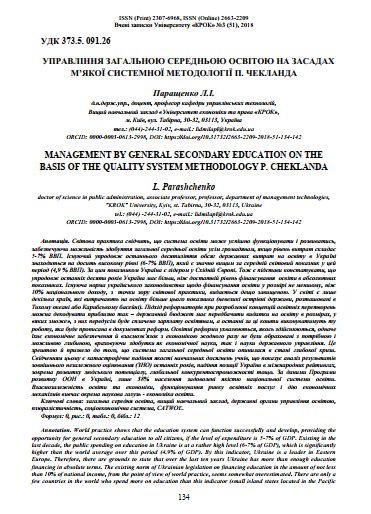MANAGEMENT BY GENERAL SECONDARY EDUCATION ON THE BASIS OF THE QUALITY SYSTEM METHODOLOGY P.CHEKLANDA
DOI:
https://doi.org/10.31732/2663-2209-2018-51-134-142Keywords:
secondary education, higher education institution, state education authorities, pluralism, socioeconomic system, CATWOEAbstract
World practice shows that the education system can function successfully and develop, providing the opportunity for general secondary education to all citizens, if the level of expenditure is 5-7% of GDP. Existing in the last decade, the public spending on education in Ukraine is at a rather high level (6-7% of GDP), which is significantly higher than the world average over this period (4.9% of GDP). By this indicator, Ukraine is a leader in Eastern Europe. Therefore, there are grounds to state that over the last ten years Ukraine has more than enough education financing in absolute terms. The existing norm of Ukrainian legislation on financing education in the amount of not less than 10% of national income, from the point of view of world practice, seems somewhat overestimated. There are only a few countries in the world who spend more on education than this indicator (small island states located in the Pacific or the Caribbean). The approach of reformers in developing the concepts of educational transformations can be decoded approximately so - the state budget should foresee the expenditures on education in the "who will be able to", first of all they will pay salaries to educators, and the last for these funds will carry out the work that will be recorded in the documents reforms. Educational reforms are adopted, somehow implemented, however, their economic support and the relationship with the economy have never been counted with the right and possible depth, taking into account the achievements of both economic science and the science of state administration. This eventually led to the fact that the system of general secondary education was in a state of deep crisis. Evidence for this is the catastrophic decline in the quality of academic achievement of students, which shows the analysis of the results of external independent evaluation (EAR) in recent years, the fall of Ukraine's position in international rankings, in particular human development, global competitiveness, etc. According to the United Nations Development Program in Ukraine, only 38% of the population are satisfied with the quality of the national education system. The interdependence of education and economics, the functioning of the educational services market and the operation of economic mechanisms is studied by
a separate scientific branch - the education economy.
Downloads


